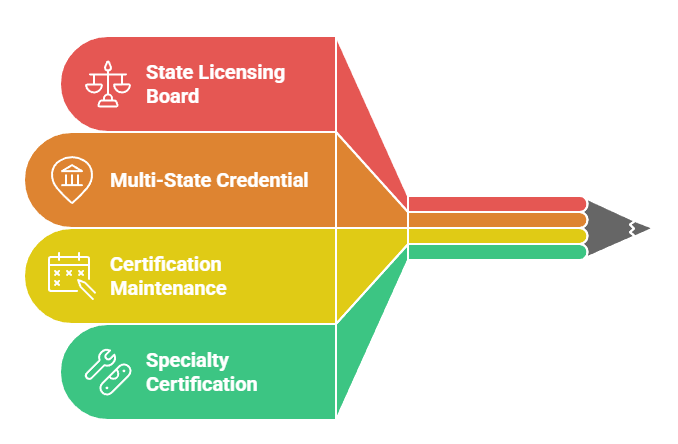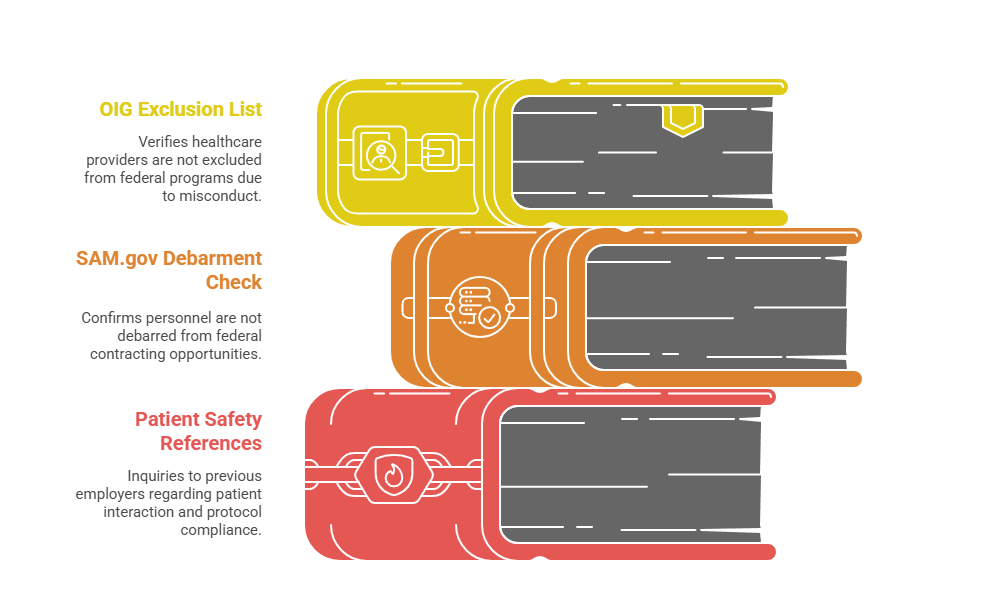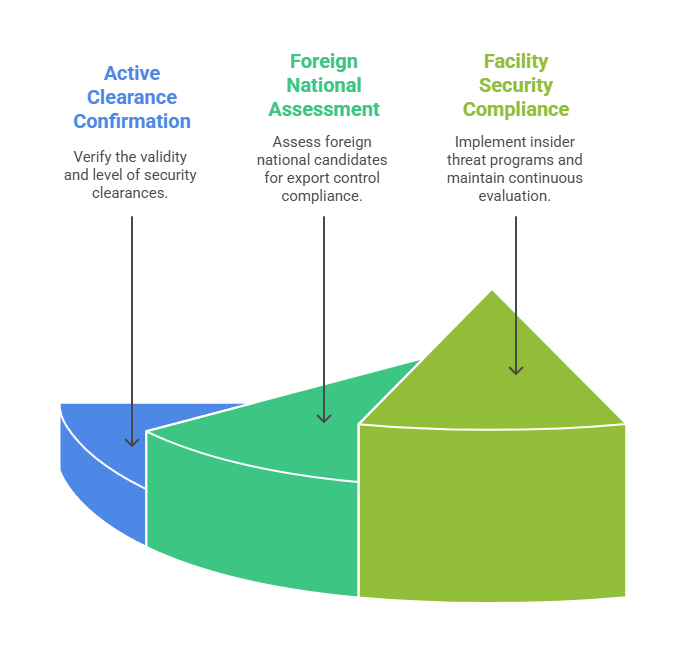Colorado's biotech background checks require specialized screening protocols that address FDA regulations, controlled substance handling clearances, and intellectual property protection. These standards far exceed general employment verification requirements. Life sciences companies in Colorado's Front Range corridor must navigate state-specific statutes alongside federal biotech screening mandates. They must also maintain competitive hiring timelines in one of America's fastest-growing pharmaceutical markets.
Key Takeaways
- Colorado biotech employers must comply with FDA 21 CFR Part 11 requirements for electronic records verification, creating unique background screening documentation standards not applicable to other industries.
- The state's mandatory seven-year background check limitation doesn't apply to pharmaceutical positions involving controlled substances, allowing deeper historical reviews for DEA-regulated roles.
- Colorado's 2021 Criminal Records Screening law (HB21-1290) requires individualized assessments before adverse action, but provides industry-specific exemptions for biosafety level facilities and FDA-regulated manufacturing environments.
- Front Range biotech companies face average 18-22 day hiring cycles, making expedited background verification critical for securing top talent in competitive markets like Denver's RiNo BioDistrict and Boulder's innovation corridor.
- Life sciences screening must verify educational credentials from STEM programs, with particular attention to international degree validation as 34% of Colorado biotech researchers hold foreign qualifications.
- Intellectual property protection screening—including previous employer agreements and patent litigation history—has become standard practice for 78% of Colorado pharmaceutical companies hiring research personnel.
- Colorado's Consumer Protections for Workers Act mandates salary disclosure in job postings, creating transparency that accelerates candidate decision-making but increases pressure for rapid background check completion.
- Biotech-specific drug testing protocols extend beyond standard 5-panel screens to include performance-enhancing substances and pharmaceutical diversion indicators required by DEA registration maintenance.
Understanding Colorado's Biotech Background Check Regulatory Framework
Colorado's life sciences sector operates under a complex regulatory framework. It combines state employment laws with federal pharmaceutical oversight. The intersection creates unique compliance requirements. Generic background screening programs cannot adequately address these specialized needs. Pharmaceutical employers must balance speed with thoroughness while navigating multiple jurisdictional requirements.
Federal FDA Requirements for Colorado Pharmaceutical Employers
The FDA mandates background verification for personnel with specific access privileges. This includes drug manufacturing systems, clinical trial data, and laboratory quality control processes. Under 21 CFR Part 11, Colorado biotech companies must maintain auditable records of employee screening results. These records include educational verification, professional licensure confirmation, and employment history validation extending seven years minimum.
Colorado pharmaceutical manufacturers holding FDA registrations face additional scrutiny during facility inspections. FDA investigators routinely review personnel files. They confirm appropriate background screening occurred before granting system access privileges. The Drug Supply Chain Security Act (DSCSA) imposes further obligations on Colorado companies involved in pharmaceutical distribution. Personnel handling prescription medications require verification of clean criminal records. These specifically examine theft, fraud, and controlled substance violations.
Colorado State-Specific Employment Screening Laws
Colorado's Criminal Records Screening law (HB21-1290) fundamentally changed how employers may use criminal history information. However, it carved out critical exceptions for life sciences facilities. The law requires individualized assessments before taking adverse action. Employers must consider offense nature, time elapsed, and job relevance based on criminal records.
Positions involving biosafety level 2 or higher laboratories receive modified treatment under the statute. The same applies to roles with controlled substance access or direct patient contact in clinical research settings. Colorado's Chance to Compete Act prohibits inquiring about criminal history on initial applications. However, exceptions exist for positions requiring state or federal security clearances. Many biotech roles qualify for these exemptions. This particularly includes those involving export-controlled research or Department of Defense contracts. These exemptions permit earlier criminal history screening than Colorado law otherwise allows.
DEA Registration and Controlled Substance Handling Clearances
Colorado biotech companies maintaining DEA registrations for Schedule II-V controlled substances face heightened employee screening obligations. DEA regulations require background investigations for specific personnel categories. This includes those with access to controlled substance storage areas. It also covers manufacturing lines producing regulated pharmaceuticals. Clinical trial facilities dispensing investigational drugs fall under these requirements as well.
The DEA's "Drug Theft and Loss" reporting requirements create liability for pharmaceutical employers. Companies that fail to adequately screen employees face consequences. This becomes particularly serious when employees are subsequently involved in diversion incidents. Front Range pharmaceutical manufacturers report implementing continuous monitoring programs. These alert HR departments to employee arrests, professional license actions, or DEA sanctions occurring post-hire. These ongoing screening programs have become industry standard practice. In fact, 82% of Colorado life sciences companies with DEA registrations maintained some form of post-employment monitoring by 2024.
Essential Components of Colorado Biotech Background Screening Programs
Comprehensive life sciences background checks extend far beyond standard employment verification. Colorado's competitive biotech market demands screening programs that validate specialized qualifications. These must maintain compliance with industry-specific regulations. Life sciences employers must implement multi-layered verification. This addresses both educational credentials and professional competencies.
Educational Credential Verification for STEM Positions
Educational verification represents the foundation of biotech screening. This particularly applies to Colorado's research-intensive companies. Pharmaceutical employers must confirm degrees from accredited institutions. They validate specialized certifications. They also verify advanced training in biological sciences, chemistry, pharmacology, and related disciplines.
Colorado biotech companies face particular challenges verifying international credentials. Notably, 34% of the state's life sciences researchers earned degrees from foreign universities. Credential evaluation services specializing in international academic verification have become essential partners. Research positions require verification of publications, patents, and advanced degrees. This includes Ph.D. and postdoctoral training. This depth of verification typically extends timelines by 5-7 business days compared to standard background checks. However, it provides critical protection against credential fraud.
Professional License and Certification Validation
Many Colorado biotech positions require active professional licenses subject to regulatory oversight. The verification process examines multiple documentation layers. This ensures candidates meet regulatory standards. License verification extends beyond simple confirmation of active status. It includes complete history and maintenance compliance.
Key validation components include:

- State Licensing Board Confirmation: Verification through Colorado Department of Regulatory Agencies (DORA) databases ensures licenses remain in active, unrestricted status. This confirms no disciplinary actions or practice conditions exist.
- Multi-State Credential Review: Companies with distributed operations verify compact licenses and multi-jurisdictional credentials. They work through both Colorado authorities and interstate commissions.
- Certification Maintenance Compliance: Verification confirms current status plus adherence to continuing education requirements. This includes periodic renewal and professional standards throughout anticipated employment tenure.
- Specialty Certification Validation: GMP training, Certified Biological Safety Professional (CBSP) credentials, and specialized analytical equipment certifications require individual confirmation. This happens through professional organizations and training providers.
Colorado pharmaceutical employers routinely request complete license history. This identifies any temporary suspensions or conditions placed on practice privileges. These comprehensive checks protect companies from regulatory violations and patient safety risks.
Criminal Background Investigations for Laboratory and Manufacturing Personnel
Criminal background screening for Colorado biotech positions follows protocols more stringent than general employment checks. Life sciences employers must examine criminal history at county, state, and federal levels. The screening focuses on offense categories threatening pharmaceutical operations and patient safety.
| Offense Category | Biotech-Specific Concerns | Typical Disqualification Threshold |
| Theft/Fraud | Intellectual property theft, controlled substance diversion, research data integrity | Permanent disqualification regardless of time elapsed |
| Drug-Related | Manufacturing/distribution of controlled substances, pharmaceutical diversion | Case-by-case review for federal DEA-registered facilities |
| Violence | Biosafety laboratory risks, patient safety in clinical trials, workplace security | Individualized assessment required under HB21-1290 |
| Healthcare Fraud | FDA violations, clinical trial misconduct, regulatory non-compliance | Permanent bar from FDA-regulated positions |
Federal criminal database searches have become standard practice for Colorado life sciences companies. This particularly applies to those with government contracts or FDA-regulated operations. PACER searches identify federal convictions. These include healthcare fraud, FDA violations, controlled substance trafficking, and export control violations. These may not appear in state criminal databases.
Specialized Screening Requirements for Colorado Life Sciences Roles

Different biotech positions demand tailored screening protocols. These address role-specific compliance requirements and risk factors. Colorado employers have developed specialized verification programs. They match screening depth to position responsibilities. Industry-specific roles require customized approaches that generic employment screening cannot adequately address.
Clinical Research and Patient-Facing Positions
Clinical research positions involving direct patient interaction require the most comprehensive background screening. This applies across Colorado's biotech sector. These roles demand verification extending beyond standard pharmaceutical screening. They include healthcare-specific regulatory checks. Colorado requires fingerprint-based background checks for clinical research personnel with patient access in certain healthcare settings.
Mandatory regulatory screenings include:

- OIG Exclusion List Verification: The Office of Inspector General's List of Excluded Individuals and Entities (LEIE) identifies healthcare providers barred from federal healthcare programs. This occurs due to fraud, patient abuse, or professional misconduct.
- SAM.gov Debarment Check: System for Award Management exclusion verification confirms personnel aren't debarred from federal contracting. This is required for Colorado biotech companies with Department of Defense or Veterans Affairs contracts.
- Patient Safety References: Previous employer inquiries specifically address patient interaction quality. They also cover protocol compliance, adverse event reporting practices, and any terminations. This includes those for protocol violations or informed consent irregularities.
Clinical trial staff terminated for protocol violations typically result in disqualification from similar roles. The same applies to those with patient safety incidents. Colorado clinical research sites receiving federal funding must verify employees and contractors. They ensure these individuals don't appear on exclusion lists before assignment to federal projects.
Laboratory Scientists and Quality Control Personnel
Laboratory scientist positions require verification of technical competencies alongside standard background elements. Colorado pharmaceutical employers validate laboratory technique training. They confirm equipment-specific certifications. They also verify analytical method experience through previous employer references and training documentation review. Data integrity verification has emerged as a critical screening component. This follows numerous FDA warning letters citing violations.
Background screening for quality control chemists, analytical scientists, and laboratory technicians now routinely includes previous employer inquiries. These specifically address adherence to good laboratory practices. They cover accurate data recording, protocol deviation history, and any involvement in FDA observations or warning letters. Biosafety training verification applies to Colorado laboratory personnel working with potentially hazardous biological materials. CDC Select Agent regulations require FBI criminal history records checks. This applies to personnel with access to specified biological agents and toxins.
Manufacturing and Production Team Members
Colorado pharmaceutical manufacturing personnel undergo screening emphasizing reliability, attention to detail, and compliance consciousness. Production line workers, manufacturing technicians, and packaging specialists represent the workforce segment most directly impacting product quality. They also most directly impact patient safety. Manufacturing background checks verify previous employment in regulated industries. Preference goes to candidates demonstrating FDA-inspected facility experience.
| Verification Component | Assessment Focus | Disqualification Factors |
| Previous Manufacturing Experience | SOP adherence, batch record accuracy, cleanroom protocol compliance | Pattern of documentation errors, GMP violations |
| Attendance History | Reliability for critical production schedules | Chronic absenteeism causing production disruptions |
| Safety Record | Equipment operation, hazard handling, OSHA compliance | Recordable injuries, safety protocol violations |
Controlled substance access roles require enhanced screening under DEA regulations. Manufacturing personnel involved in Schedule II-V pharmaceutical production undergo criminal background investigations. These examine drug-related offenses, theft, and fraud more extensively than non-controlled substance positions.
Intellectual Property and Security Clearance Considerations
Colorado's biotech sector faces significant intellectual property theft risks. This requires specialized screening protocols. Companies developing novel therapeutics, medical devices, and diagnostic technologies must protect proprietary research. They do this through comprehensive pre-employment verification. IP screening has become standard practice. Competition for breakthrough discoveries intensifies across the Front Range corridor.
Previous Employer Confidentiality Agreement Verification
Intellectual property screening for Colorado biotech research positions includes verification of existing confidentiality obligations. New hires from competitor pharmaceutical companies may remain bound by restrictive agreements. These include non-compete agreements, invention assignment clauses, or trade secret restrictions. These may limit their ability to contribute to certain research projects. Colorado's worker-friendly non-compete limitations (C.R.S. § 8-2-113) void most restrictive covenants. However, it carves out exceptions for trade secret protection.
Colorado biotech companies verify whether candidates signed enforceable non-compete agreements in other states. These may be maintained under choice-of-law provisions. Background screening for senior research scientists now routinely includes review of patent assignment agreements with previous employers. Publication review represents another intellectual property screening component. Employers search PubMed, Google Scholar, and preprint servers. They identify candidates' previous research publications.
Export Control and Government Security Clearance Verification
Colorado biotech companies engaged in defense-related research face export control compliance obligations. The same applies to those in dual-use technology development or international collaboration. These require specialized employee screening. ITAR (International Traffic in Arms Regulations) and EAR (Export Administration Regulations) govern technologies subject to export restrictions. Security clearance verification applies to Colorado life sciences companies with Department of Defense contracts. It also applies to those with classified research programs.
Critical verification elements include:

- Active Clearance Confirmation: Background screening must confirm security clearances remain valid. It must verify clearance levels match position requirements.
- Foreign National Employment Assessment: Deemed export regulations require determining whether foreign national candidates can access export-controlled technology. This assessment is based on visa status and countries of origin.
- Facility Security Clearance (FCL) Compliance: Companies seeking FCLs must implement insider threat programs. They must conduct periodic reinvestigations. They must also maintain continuous evaluation of cleared personnel.
Approximately 31% of Colorado pharmaceutical research personnel require visa sponsorship. This makes immigration law compliance integral to background screening programs. Companies must verify visa status permits planned employment. They must assess whether candidates' countries of origin create export control restrictions.
Colorado Drug Testing Protocols for Pharmaceutical Industry Workers
Drug testing represents a critical but legally complex component of biotech background screening in Colorado. Marijuana legalization conflicts with federal pharmaceutical regulations and workplace safety requirements. Pharmaceutical employers must navigate competing legal frameworks. They must maintain compliant testing programs simultaneously.
Federal Requirements vs. Colorado State Law
Colorado's marijuana legalization creates unique challenges for pharmaceutical employers. These employers are subject to federal drug-free workplace requirements. While Amendment 64 legalized recreational marijuana, protections don't extend to federally regulated employers. The state's Lawful Off-Duty Activities Statute protects off-duty legal conduct. However, these protections also have limits. DEA-registered pharmaceutical facilities in Colorado maintain the right to prohibit marijuana use. This applies despite state legalization.
Colorado courts have consistently upheld employers' rights to terminate employees for positive marijuana tests. This applies in safety-sensitive positions or federally regulated workplaces. The landmark Coats v. Dish Network case confirmed that Colorado's Lawful Off-Duty Activities Statute has limits. It protects only activities lawful under both state and federal law. Drug-free workplace policies for federal contractors remain in effect for Colorado biotech companies with government contracts. These require compliance regardless of state marijuana legalization.
Industry-Specific Pharmaceutical Testing Panels
Standard 5-panel drug screens prove insufficient for many Colorado pharmaceutical positions. Life sciences employers have adopted expanded testing protocols. These address industry-specific risks. Enhanced panels detect pharmaceutical diversion and performance-enhancing drug use in competitive research environments. They also identify novel psychoactive substances that standard panels miss.
Pharmaceutical-specific drug panels test for prescription medications with diversion potential. These include fentanyl analogs, synthetic opioids, and designer benzodiazepines. Laboratory personnel with controlled substance access undergo expanded testing quarterly or semi-annually. This occurs as ongoing employment conditions. Biological specimen validity testing prevents sample tampering. It uses temperature verification, creatinine level testing, specific gravity measurement, and pH analysis. This occurs before reporting drug test results.
Navigating Colorado Biotech Hiring Timelines and Candidate Experience
Colorado's competitive life sciences talent market demands background screening programs that balance comprehensive verification with candidate experience preservation. Extended screening timelines risk losing top candidates to competing offers. This occurs in Denver's RiNo BioDistrict and Boulder's thriving biotech corridor. Front Range pharmaceutical companies report average time-to-hire of 18-22 days for research positions. Background screening consumes 5-8 days of this timeline.
Expedited Verification Services for Competitive Markets
Delayed verification results frequently cause candidate acceptance of competing offers. This makes screening speed a competitive necessity. Concurrent verification processes dramatically reduce screening timelines. They simultaneously launch all verification components upon candidate authorization. This parallel processing approach reduces total screening time by 40-50% compared to traditional sequential methods.
Digital verification platforms have accelerated Colorado biotech screening. These use automated interfaces with National Student Clearinghouse for instant degree verification. They also connect to DORA's online databases for real-time credential confirmation. Expedited international verification services utilize global partner networks. These reduce timelines to 3-5 days for most countries. Traditional processing takes 10-15 business days. Provisional start dates with contingent employment status allow Colorado employers to onboard candidates during orientation. This occurs while awaiting final verification results.
Maintaining Compliance During Rapid Screening Processes
Speed cannot compromise compliance quality. Colorado biotech employers accelerating background checks must maintain adherence to FCRA requirements. They must follow state law obligations and industry-specific verification standards. This applies despite compressed timelines. FCRA disclosure and authorization procedures require careful attention. Employers must provide standalone disclosure documents. They must obtain candidate signatures before initiating checks.
Adverse action procedures demand appropriate timing even when hiring urgency exists. Colorado employers receiving background check results warranting adverse action must provide pre-adverse action notices. These include a copy of the background report and FCRA rights summaries. Then they must wait reasonable periods before finalizing rejection decisions. This typically means 5 business days. Individualized assessment obligations under Colorado's criminal records law require thoughtful evaluation. This applies despite time pressures. Pharmaceutical employers must document consideration of offense nature. They must assess time elapsed since conviction, evidence of rehabilitation, and job duty nexus.
Selecting Biotech-Specialized Background Screening Partners in Colorado
Generic background check providers lack the specialized knowledge required for compliant, efficient Colorado life sciences screening. They also lack regulatory expertise and industry connections. Pharmaceutical employers require partners understanding both Colorado employment law nuances and federal biotech regulatory requirements. The right vendor partnership significantly impacts both compliance outcomes and competitive hiring success.
Essential Qualifications for Life Sciences Screening Vendors
FCRA compliance certification represents the baseline qualification for any Colorado background screening vendor. Providers should demonstrate Professional Background Screening Association (PBSA) accreditation. This maintains rigorous operational standards for accuracy, fairness, and legal compliance. FDA-regulated industry experience distinguishes specialized biotech screening vendors from generalist providers. Pharmaceutical employers seek partners demonstrating documented experience serving life sciences clients.
Colorado-specific legal expertise ensures screening programs comply with state law nuances. This includes HB21-1290 criminal records screening requirements. It covers the Chance to Compete Act's prohibition on application-stage criminal history inquiries. It also addresses marijuana testing rights under Coats v. Dish Network. Scientific credential verification capabilities matter for research-intensive positions. This requires vendor relationships with credential evaluation services for international degree validation. It also requires access to professional organization databases for certification verification.
Technology Integration and Ongoing Monitoring Services
Applicant tracking system (ATS) integration streamlines background screening workflows for Colorado biotech employers. API connections between ATS platforms and screening vendors enable automatic screening initiation. This occurs upon candidate advancement. They provide real-time status updates visible within recruitment systems. They enable seamless results delivery without manual data transfer. This integration reduces administrative burden. It accelerates hiring processes significantly.
Continuous monitoring programs provide ongoing risk management beyond pre-employment screening:
- Real-Time Alerts: HR receives immediate notification of employee arrests. They also get alerts about professional license actions or expirations, DEA sanctions, and OIG exclusion list additions.
- Audit Trail Documentation: Complete verification documentation packages with timestamped audit logs support FDA inspection readiness. Retention exceeds regulatory requirements.
- Compliance Dashboard Reporting: Analytics show screening completion rates and average turnaround times by verification type. They display adverse action rates and reasons, plus FCRA adherence metrics.
These ongoing services protect against compliance risks developing during employment tenure. Dashboard reporting delivers compliance visibility for Colorado life sciences companies managing large workforces. This supports continuous program improvement. It identifies process bottlenecks.
Conclusion
Colorado biotech background checks demand specialized expertise. They require navigating the intersection of state employment laws, federal pharmaceutical regulations, and life sciences industry standards. The state's thriving Front Range biotech corridor has created intense competition for qualified talent. This places premium value on screening programs balancing comprehensive verification with rapid turnaround times. Pharmaceutical employers who implement industry-specific screening protocols position themselves as compliance-conscious organizations. These protocols address FDA requirements, controlled substance handling, and intellectual property protection. These organizations become attractive to top-tier candidates. Partnering with specialized background screening vendors delivers strategic advantages. These vendors understand both Colorado's unique legal landscape and biotech sector requirements. This represents not merely a compliance obligation but a competitive advantage in the state's dynamic life sciences market.
Frequently Asked Questions
How long do background checks take for Colorado biotech positions?
Standard Colorado biotech background checks typically require 5-8 business days for completion. Complex verifications may extend to 10-15 business days. This includes those involving international education credentials or federal security clearances. Expedited services using concurrent verification processes can reduce timelines to 3-5 days for most positions. Delays most commonly occur with international degree verification or previous employer responsiveness issues. County court records requiring manual retrieval also cause delays.
Can Colorado biotech employers test for marijuana despite state legalization?
Yes, Colorado pharmaceutical employers retain the right to prohibit marijuana use and test for cannabis products despite state legalization. This particularly applies to DEA-registered facilities. The Colorado Supreme Court's Coats v. Dish Network decision established that the Lawful Off-Duty Activities Statute protects only conduct lawful under both state and federal law. Since marijuana remains federally illegal as a Schedule I controlled substance, employers can implement zero-tolerance policies. They can terminate employees for positive marijuana tests.
What criminal history can disqualify candidates from Colorado pharmaceutical positions?
Criminal disqualifications depend on offense nature, time elapsed, and specific job duties under Colorado's individualized assessment requirements (HB21-1290). Theft, fraud, controlled substance distribution, and violent offenses typically warrant disqualification for pharmaceutical roles. This applies to those involving controlled substance access, clinical trial participation, or quality control responsibilities. However, Colorado employers must conduct individualized assessments. They must consider rehabilitation evidence, offense relationship to job duties, and time since conviction before taking adverse action.
Do Colorado life sciences positions require fingerprint background checks?
Fingerprint-based background checks aren't universally required but apply to specific role categories. This includes clinical research personnel with patient access, laboratory workers handling CDC Select Agents, and employees requiring federal security clearances. Many Colorado pharmaceutical companies voluntarily implement fingerprint screening for positions with controlled substance access. They also use it for proprietary research involvement as best practice. FBI fingerprint checks provide more comprehensive criminal history than name-based searches.
How do Colorado biotech employers verify international educational credentials?
International credential verification requires specialized evaluation services. These translate foreign degrees to U.S. educational equivalency standards. NACES member organizations like World Education Services confirm institutional accreditation, degree authenticity, and educational equivalency to U.S. degrees. They also validate specialized coursework. Colorado biotech employers typically require course-by-course evaluations for research positions. These provide detailed analysis of scientific training, laboratory coursework, and thesis research. Verification timelines average 7-10 business days for most countries.
What is the Fair Credit Reporting Act (FCRA) and how does it apply to Colorado biotech screening?
The FCRA establishes federal requirements for background checks used in employment decisions. It applies to all Colorado biotech employers using third-party screening companies. FCRA obligations include providing standalone written disclosure before obtaining background reports. Employers must secure written authorization before initiating checks. They must provide adverse action notices with report copies. They must maintain compliance documentation. Colorado biotech employers face potential liability including actual damages and statutory penalties up to $1,000 per violation.
How often should Colorado pharmaceutical companies conduct background rescreening for existing employees?
Ongoing screening frequency depends on position risk levels and regulatory requirements. DEA-registered facilities commonly implement annual criminal background rescreening for employees with controlled substance access. Clinical research organizations typically conduct biennial screening for patient-facing staff. Quality control personnel in FDA-regulated manufacturing may undergo screening every 3-5 years. Continuous monitoring programs provide real-time alerts for arrests, license actions, or exclusion list additions. These occur between formal rescreening cycles.
What intellectual property screening should Colorado biotech employers conduct?
IP screening includes USPTO patent database searches identifying candidate inventorship. It involves review of previous employer confidentiality and non-compete agreements from other states. Publication searches in PubMed and Google Scholar identify potential research conflicts. Verification of trade secret access at previous positions is also included. Senior scientists, research directors, and principal investigators typically undergo more extensive IP screening than laboratory technicians. Colorado's strong worker mobility protections limit non-compete enforcement but preserve trade secret protection.
Additional Resources
- Colorado Department of Regulatory Agencies - Professional License Verification
https://apps.colorado.gov/dora/licensing/Lookup/LicenseLookup.aspx - FDA Guidance on Personnel Qualifications for Pharmaceutical Manufacturing
https://www.fda.gov/regulatory-information/search-fda-guidance-documents/quality-systems-approach-pharmaceutical-cgmp-regulations - DEA Security Requirements for Controlled Substance Handlers
https://www.deadiversion.usdoj.gov/21cfr_part1300/1301/1301_76.htm - Colorado HB21-1290: Criminal Records Screening in Employment
https://leg.colorado.gov/bills/hb21-1290 - OIG List of Excluded Individuals and Entities Database
https://oig.hhs.gov/exclusions/ - Professional Background Screening Association - Accreditation Standards
https://www.pbsa.org/accreditation/ - Federal Select Agent Program Security Risk Assessment Requirements
https://www.selectagents.gov/compliance/security.htm - National Association of Credential Evaluation Services Member Directory
https://www.naces.org/members

GCheck Editorial Team
Meet the GCheck Editorial Team, your trusted source for insightful and up-to-date information in the world of employment background checks. Committed to delivering the latest trends, best practices, and industry insights, our team is dedicated to keeping you informed.
With a passion for ensuring accuracy, compliance, and efficiency in background screening, we are your go-to experts in the field. Stay tuned for our comprehensive articles, guides, and analysis, designed to empower businesses and individuals with the knowledge they need to make informed decisions.
At GCheck, we're here to guide you through the complexities of background checks, every step of the way.





